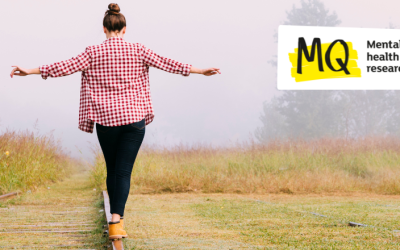For the first episode of our new web show, MQ's Many Questions, Craig sat down with speciality doctor in eating disorders, Dr Chukwuemeka “Chuks” Nwuba, to talk about eating disorders in men and how we can support a loved one with an eating disorder.
As it’s Eating Disorder Awareness Week, what attracted you to the field of eating disorders?
To be honest, I fell into it. I have always wanted to be an ophthalmologist, which is an eye surgeon. That was my thing and my main focus. And then, one day, I sat down and asked myself, “how much do I actually like eyes?”
I think it became clear that mental health was important. I wanted some an experience in mental health, so I joined a hospital, and I had no idea what ward I would be on.
They said, “by the way, you’re on an eating disorder ward”. And since then, it’s been so exciting in so many ways. There’s such brilliant research. I think, in general, the collision of physical and mental health, if you want to split them, is so interesting to me.
How would you describe eating disorders?
The term eating disorders is a misnomer because the eating aspect isn’t always a big issue. Often it’s after eating. For example, we talk about people who do engaging behaviours after eating to counteract the nutrition they've had. And in general, eating disorders are a diagnosed group of conditions which involve an abnormal relationship with food or their bodies.
And the thing is, it’s not always food, and often food is not an issue. There's a lot of focus on food and weight but other things. For example, eating disorders like avoidant/restrictive food intake disorder (ARFID), in which some foods are completely okay, but it’s all the other things involved.
People often use these terms interchangeably, but what is the difference between an eating disorder and disordered eating?
I think to put it very straightforwardly, eating disorders are technical diagnoses. Disordered eating is similar to a light form of an eating disorder. For example, there’s research that, arguably, most of us have had disordered eating at some point, which is people engaging in unhealthy practices.
For example, the classic one, someone is trying to get ready for a big day, and they do certain things that they shouldn’t be doing to try and squeeze into clothes, so they would probably engage in disordered eating in that period.
But that doesn't necessarily mean they have an eating disorder. Eating disorders are a mental health condition which can get very serious, often out of the control of the actual individual.
Would you say fad diets fall under the category of disordered eating?
Exactly! Things like that would fall under disordered eating. For example, a huge situation now is muscle dysmorphia in men. They end up malnourished because they’re trying to focus on overeating certain food groups and undereating some others, which is disordered eating.
There are other things like orthorexia, which is again not an official eating disorder, where people focus on pure foods or eating clean. They’re concerned about how food is prepped and won’t have anything with synthetic substances, for example.
As you mentioned men, which is the theme for this year’s Eating Disorder Awareness Week, have you noticed any differences in how eating disorders present in men and women?
The presentation between men and women is stereotypically different. In some eating disorders, there is a push to be slim, whereas you don't necessarily see that to the same extent in men. So, for example, we talked earlier about muscles and the different outlooks on your body. What does it mean to be a man? Once you start to unpick these questions, you’ll begin to see the differences.
And then, within that, there are a million shades of grey. There's also a difference in presentation in terms of outcome. This is why research is so important because that's the only way we’ll be able to explore this truly.
How can one support a loved one with an eating disorder?
When you are caring for friends, family or someone, it can be challenging. Emotionally taxing and financially, physically, mentally, it's really, really difficult.
But if there's one piece of advice regarding supporting someone, you don't need to have the right answer. You don't have to know what to do. Sometimes less is more. Love, sometimes, is just being present. You don’t need to have the right answer all the time.
Being there is enough. Signposting them to professionals or charities might be best. Sometimes we try and help, but we often put our foot in it. We can even ask the individual, How would you like me to help?
Sometimes they might say, "no, I have no idea. Just do what you want." But often, they may say, "actually, can you please not say this?" Or tell you how to respond when they’re feeling a particular way. It's about being humble and offering support from a place of love.



